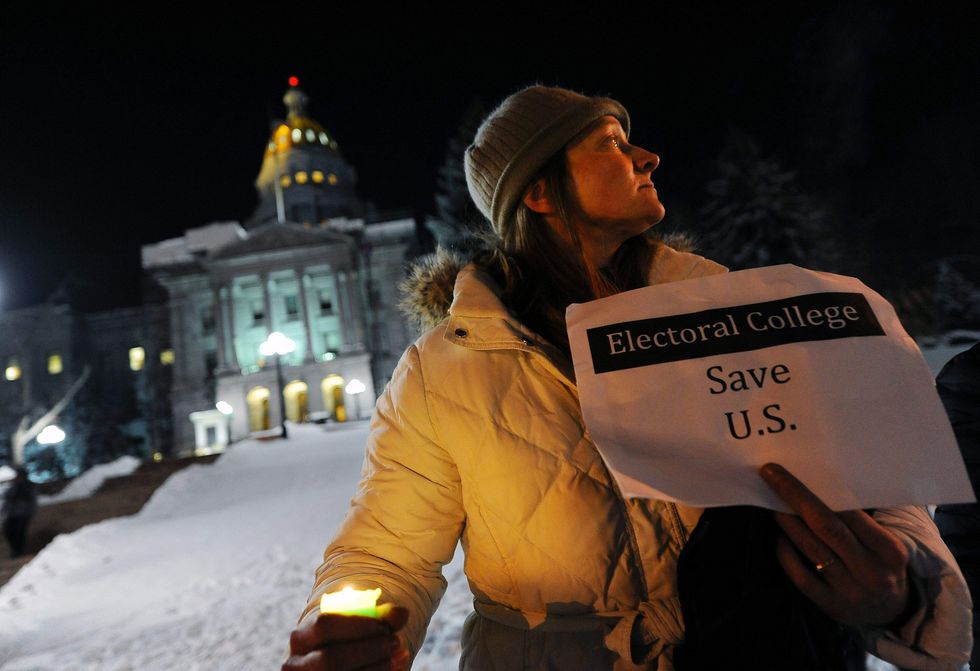While many Hillary Clinton supporters have attacked the Electoral College as unfair and undemocratic after President Donald Trump's surprising 2016 election victory, two national security experts have penned a column for Politico Magazine that goes quite a bit farther. In their column, they argue that the Electoral College presents a "national security threat" and should be abolished.
Who on earth wrote such a thing?
The column was penned jointly by Matthew Olsen and Benjamin Haas. Olsen is described in the piece as "director of the National Counterterrorism Center under President [Barack] Obama and as general counsel at the National Security Agency. He is an adjunct senior fellow at the Center for a New American Security and co-founder of IronNet Cybersecurity." Haas is described as a graduate of "West Point in 2009 and was an intelligence officer in the Army for five years, including two deployments to Afghanistan. He is now a student at Stanford Law School."
A more detailed bio for Olsen can be found on his Harvard University page. Haas's twitter feed is linked in the Politico piece and can be found here.
What is the basis for their argument?
The authors claim that James Madison could not have foreseen the rise of "fake news" and Facebook and that these pose threats to the integrity of our election system that demand re-examination of the role of the Electoral College.
Much of the piece focuses on Russian efforts to purchase Facebook ads and compromise voting systems. These efforts have been relatively well-documented.
The authors' argument is that the Electoral College makes such efforts to compromise the result of an election easier, because it allows a foreign power to target specific states (like Wisconsin) for maximum impact on a smaller budget.
This writer's perspective
Sour grapes make bitter wine. The logical problems and non-sequiturs in this column could fill a very long roster indeed. The authors do not take much pains to hide the fact that their real belief is that anything connected with the election of Donald Trump is, in their view, a national security threat.
Among other problems, the column does not purport to explain why this makes the Electoral College itself — rather than Facebook or shoddy cybersecurity — a "national security threat." Nor does it prove the highly dubious proposition that $100,000 in Facebook advertising could have swayed the result in a single state (like Wisconsin), much less across the entire rust belt.
By way of comparison, Clinton spent about $141 million in advertising in the general election, compared to about $59 million for Trump. If the Russians really spent $100,000 on Facebook ads targeting the United States, that is indeed illegal and problematic. However, the suggestion that these targeted Facebook ads were somehow more compelling than the $200 million in advertising paid for by the candidates themselves stretches credulity to the breaking point.
The minimum victory condition for Clinton is that 53,667 people would have had to change their votes in Wisconsin, Pennsylvania, and Michigan. The idea that Russia could have purchased these folks via Facebook advertising at $2 a pop is, frankly, ludicrous. And the Russians' efforts to compromise voting systems, while troubling, were failures. Olsen and Haas are clearly smart enough and credentialed enough to realize this, which strongly suggests that their real beef is with the result that the Electoral College produced.
Why does this matter?
Since the 2016 election, the Electoral College has been under a sustained assault. Democrats in particular have been irate that in two recent elections (2000 and 2016), the Democrat who won the popular vote lost the Electoral College vote and thus the election.
By a 49-47 percent margin, Americans favor abolishing the Electoral College and electing the president via national popular vote.
Americans of all political persuasions should resist this siren call. For all its flaws and frustrations, the Electoral College is the best bulwark against the election of a truly dangerous extremist or demagogue. In the absence of the Electoral College, American elections would likely devolve into six- or seven-candidate fracases.
What would be wrong with that? For one thing, the winner might well garner a very small share of the popular vote (think 30 percent or less) and thus emerge without a clear national mandate at all. Even a runoff system would lead to the sort of chaotic backroom dealing for support that characterizes European elections and leads to greater instability in European governments. Additionally, these machinations have been directly responsible for the ascent to power of a number of true tyrants across the globe (including, yes, Hitler).
The Electoral College insures that it is virtually impossible to become president in America unless you have at least 40-45 percent of the voting portion of the country behind you, and that's a valuable defense against the election of a true tyrant that should not be cast aside because of sour grapes over a couple of elections.




